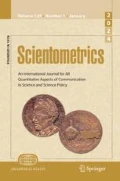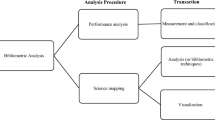Abstract
Bibliometric analyses of scientific publications provide quantitative information that enables evaluators to obtain a useful picture of a team's research visibility. In combination with peer judgements and other qualitative background knowledge, these analyses can serve as a basis for discussions about research performance quality. However, many mathematicians are not convinced that citation counts do in fact provide useful information in the field of mathematics. According to these mathematicians, citation and publication habits differ completely from scholarly fields such as chemistry or physics. Therefore, it is impossible to derive valid information regarding research performance from citation counts. The aim of this study is to obtain more insight into the significance of citation-based indicators in the field of mathematics. To which extent do citation-scores mirror to the opinions of experts concerning the quality of a paper or a journal? A survey was conducted to answer this question.Top journals, as qualified by experts, receive significantly higher citation rates thangood journals. Thesegood journals, in turn, have significantly higher scores than journals with the qualificationless good. Top publications, recorded in the ISI database, receive on the average 15 times more citations than the mean score within the field of mathematics as a whole. In conclusion, the experts' views on top publications or top journals correspond very well to bibliometric indicators based on citation counts.
Similar content being viewed by others
References
Van Raan, A. F. J., Advanced bibliometric methods to assess research performance and scientific development: basic principles and recent practical applications,Research Evaluation, 3 (1993) 151–166.
Martin, B. R., J. Irvine,Assessing basic research. Some practical indicators of scientific progress in radio astronomy,Research Policy, 12 (1983) 61–90.
Narin, F., E. S. Withlow,Measurements of scientific co-operation and co-authorship in CEC-related areas of science, Report EUR 12900, Office for Official Publications of the European Communities, Luxembourg (1990).
De Bruin, R. E., H. F. Moed, M. Luwel, A. Kint, A study of Research Evaluation and Planning: The University of Ghent.Research Evaluation, 3 (1993) 1–14.
Spruyt, E. H. J., R. E. de Bruin, H. F. Moed, Are bibliometric indicators appropriate tools in a young university?Higher Education Management, (1996) in press.
Korevaar, J. C., H. F. Moed, M. Luwel, E. Spruyt, J.A. Houben, H. Van den Berghe,Bibliometric indicators in the field of mathematics (in Dutch). Rapport ten behoeve van de Onderzoekscoördinatie van de Katholieke Universiteit Leuven en de Onderzoeksraad van de Universiteit Antwerpen (UIA). Centre for Science and Technology Studies, Leiden (1995).
Moed, H. F., Th.N. van Leeuwen, Improving the accuracy of Institute for Scientific Information's journal of the American Society for Information Science, 46 (1995) 461–467.
Author information
Authors and Affiliations
Rights and permissions
About this article
Cite this article
Korevaar, J.C. Validation of bibliometric indicators in the field of mathematics. Scientometrics 37, 117–130 (1996). https://doi.org/10.1007/BF02093488
Received:
Issue Date:
DOI: https://doi.org/10.1007/BF02093488




